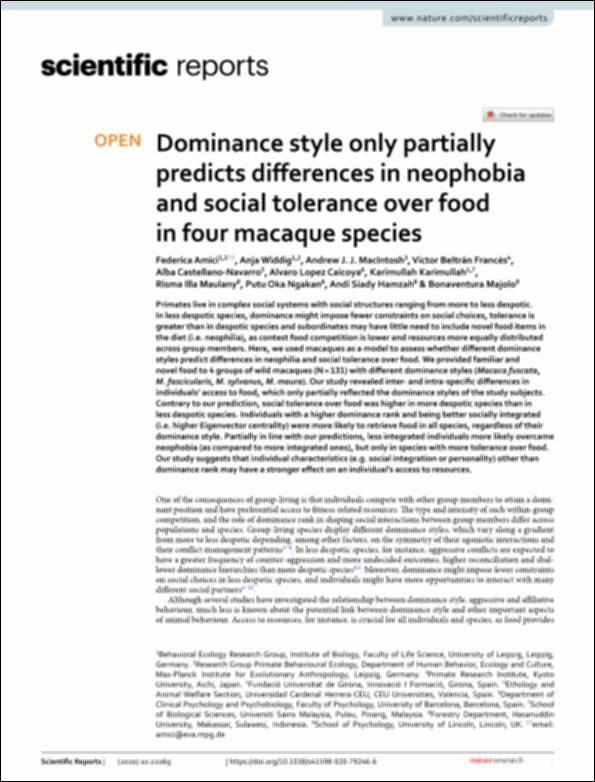Please use this identifier to cite or link to this item:
http://hdl.handle.net/10637/12779Dominance style only partially predicts differences in neophobia and social tolerance over food in four macaque species
| Title: | Dominance style only partially predicts differences in neophobia and social tolerance over food in four macaque species |
| Authors : | Amici, Federica Widdig, Anja MacIntosh, Andrew J. J. Beltrán Francés, Víctor Castellano Navarro, Alba López Caicoya, Álvaro |
| Keywords: | Psicología animal.; Macacos - Hábitos y conducta.; Primates - Behavior.; Macaques - Behavior.; Primates - Hábitos y conducta.; Animal psychology. |
| Publisher: | Nature Research. |
| Citation: | Amici, F., Widdig, A., MacIntosh, A.J.J., Beltrán Francés, V., Castellano-Navarro, A., López Caicoya, A. et al. (2020). Dominance style only partially predicts differences in neophobia and social tolerance over food in four macaque species. Scientific Reports, vol. 10, art. 22069 (16 dec.). DOI: https://doi.org/10.1038/s41598-020-79246-6 |
| Abstract: | Primates live in complex social systems with social structures ranging from more to less despotic. In less despotic species, dominance might impose fewer constraints on social choices, tolerance is greater than in despotic species and subordinates may have little need to include novel food items in the diet (i.e. neophilia), as contest food competition is lower and resources more equally distributed across group members. Here, we used macaques as a model to assess whether different dominance styles predict differences in neophilia and social tolerance over food. We provided familiar and novel food to 4 groups of wild macaques (N = 131) with different dominance styles (Macaca fuscata, M. fascicularis, M. sylvanus, M. maura). Our study revealed inter- and intra-specific differences in individuals’ access to food, which only partially reflected the dominance styles of the study subjects. Contrary to our prediction, social tolerance over food was higher in more despotic species than in less despotic species. Individuals with a higher dominance rank and being better socially integrated (i.e. higher Eigenvector centrality) were more likely to retrieve food in all species, regardless of their dominance style. Partially in line with our predictions, less integrated individuals more likely overcame neophobia (as compared to more integrated ones), but only in species with more tolerance over food. Our study suggests that individual characteristics (e.g. social integration or personality) other than dominance rank may have a stronger effect on an individual’s access to resources. |
| Description: | Este artículo se encuentra disponible en la siguiente URL: https://www.nature.com/articles/s41598-020-79246-6.pdf En este artículo también participan: Karimullah Karimullah, Risma Illa Maulany, Putu Oka Ngakan, Andi Siady Hamzah y Bonaventura Majolo. |
| URI: | http://hdl.handle.net/10637/12779 |
| Rights : | http://creativecommons.org/licenses/by/4.0/deed.es |
| ISSN: | 2045-2322 (Electrónico). |
| Issue Date: | 16-Dec-2020 |
| Center : | Universidad Cardenal Herrera-CEU |
| Appears in Collections: | Dpto. Producción y Sanidad Animal, Salud Pública Veterinaria y Ciencia y Tecnología de los Alimentos |
Items in DSpace are protected by copyright, with all rights reserved, unless otherwise indicated.


